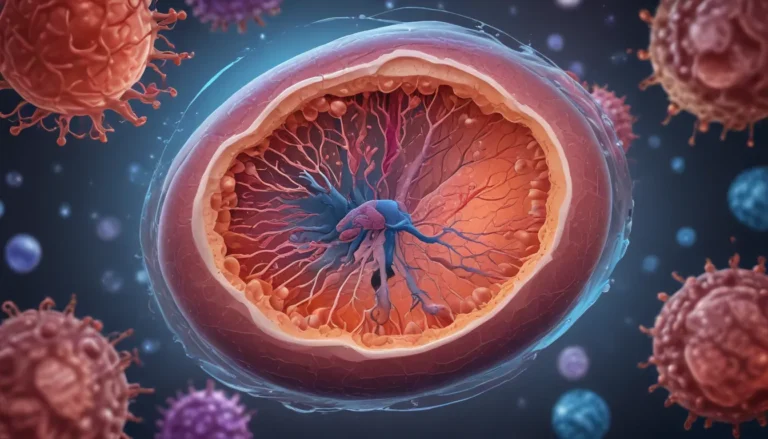A Note About Images: The images used in our articles are for illustration purposes only and may not exactly match the content. They are meant to engage readers, but the text should be relied upon for accurate information.
Inflammation is a vital response by our body’s immune system to combat infections, injuries, and diseases. While often associated with discomfort, inflammation serves a crucial role in safeguarding our overall well-being. With a surge in interest surrounding inflammation due to its connection to various health conditions, such as arthritis, heart disease, and cancer, it is essential to delve deeper into this complex biological process.
Understanding the Essence of Inflammation
In its essence, inflammation serves as the body’s natural defense mechanism against harmful stimuli, such as pathogens, toxins, or irritants. This intricate biological response involves an influx of blood flow, heightened white blood cell activity, and the release of diverse chemical mediators.
Unveiling the Duality of Inflammation: Acute vs. Chronic
Inflammation manifests in two distinct forms: acute and chronic. Acute inflammation is a transient response triggered by tissue damage or infection, while chronic inflammation persists for extended periods, potentially leading to tissue destruction and the onset of various ailments like arthritis, asthma, and cardiovascular disorders.
Embracing the Benefits of Inflammation
Contrary to popular belief, inflammation is not always a negative force. It plays a pivotal role in the healing process by eliminating pathogens and initiating tissue repair. However, when inflammation becomes chronic or excessive, it can have adverse effects on the body.
Decoding the Telltale Signs of Inflammation
The hallmark signs of inflammation include heat, redness, swelling, and pain. These telltale symptoms arise from increased blood flow, dilated blood vessels, fluid accumulation, and the release of chemical inflammatory mediators, such as prostaglandins and histamines.
Bridging Inflammation and the Immune System
Inflammation and the immune system share a close-knit relationship. When the body perceives a threat, immune cells release inflammatory proteins and chemicals to combat invaders. This immune response is pivotal in shielding the body against infections and diseases.
Illuminating the Role of Cytokines in Inflammation
Cytokines act as pivotal messengers in inflammation, facilitating communication between cells, regulating immune responses, and promoting the recruitment of immune cells to sites of injury or infection.
Addressing the Nexus between Inflammation and Aging
Chronic inflammation has been intricately linked to the aging process. With advancing age, the immune system may struggle to effectively regulate inflammation, heightening the susceptibility to chronic diseases.
Nourishing the Body: Dietary Factors in Inflammation
Dietary choices can either fuel or combat inflammation in the body. Foods high in sugar, refined carbohydrates, and unhealthy fats can trigger inflammation, while a diet abundant in fruits, vegetables, whole grains, and Omega-3 fatty acids can mitigate inflammatory responses.
Tackling Stress-Induced Inflammation
Chronic stress can exacerbate inflammation. Psychological stress triggers the release of stress hormones, ramping up inflammation levels within the body.
Embracing Exercise as an Anti-Inflammatory Ally
Moderate exercise boasts anti-inflammatory effects on the body. Regular physical activity can mitigate chronic inflammation and reduce the risk of inflammatory diseases.
Unraveling the Connection Between Inflammation and Skin Conditions
Inflammation underpins several skin conditions, including acne, eczema, and psoriasis. These conditions stem from abnormal immune responses and inflammation within the skin.
Shedding Light on Inflammation and Mental Health
Research suggests a correlation between inflammation and mental health disorders like depression and anxiety. Chronic inflammation can impede brain function and neurotransmitter activity, potentially contributing to mental health challenges.
Navigating Inflammatory Bowel Diseases
Inflammatory bowel diseases, such as Crohn’s disease and ulcerative colitis, are characterized by chronic inflammation in the digestive tract, eliciting symptoms like abdominal pain and diarrhea.
Safeguarding Heart Health: the Inflammatory Connection
Chronic inflammation stands as a risk factor for heart disease. Inflammatory markers like C-reactive protein (CRP) can signal systemic inflammation and predict cardiovascular events.
Harnessing the Power of Antioxidants Against Inflammation
Antioxidants play a crucial role in combating inflammation by neutralizing free radicals, which can damage cells and fuel inflammatory responses. Foods rich in antioxidants, such as berries, dark leafy greens, and nuts, offer protective benefits against inflammation.
Embracing Rest: Sleep’s Impact on Inflammation
Inadequate sleep quality and duration can escalate inflammation within the body. Sleep deprivation disrupts immune function and elevates the production of inflammatory proteins.
Unveiling the Link Between Inflammation and Cancer
Chronic inflammation has been associated with an elevated risk of certain cancers. Inflammatory cells and molecules can stimulate tumor growth, invasion, and metastasis.
Paving the Path Towards Reduced Inflammation Through Lifestyle Changes
Implementing lifestyle modifications can diminish inflammation and bolster overall health. Maintaining a healthy weight, quitting smoking, managing stress, engaging in regular exercise, and embracing a balanced diet rich in anti-inflammatory foods hold the key to alleviating inflammation.
Conclusion: Nurturing a Harmonious Relationship with Inflammation
Inflammation is a multifaceted biological process pivotal in protecting the body against harm. While necessary and beneficial in acute settings, chronic inflammation can pose health risks. By embracing the intriguing facets of inflammation, we equip ourselves with the knowledge to navigate and prevent chronic inflammation, fostering enhanced well-being and overall health.
FAQs: Navigating Inflammation with Ease
-
Q: What causes inflammation?
A: Inflammation can stem from various factors, including infections, injuries, autoimmune disorders, and environmental triggers. -
Q: How can I reduce inflammation naturally?
A: Incorporate an anti-inflammatory diet rich in fruits, vegetables, whole grains, and healthy fats, coupled with regular exercise, stress management, and ample sleep. -
Q: Can inflammation benefit the body?
A: Acute inflammation is essential for tissue protection, healing, and infection eradication, highlighting its beneficial role. -
Q: What are the symptoms of chronic inflammation?
A: Symptoms can encompass fatigue, joint pain, digestive disturbances, skin issues, and recurrent infections. -
Q: Are there foods that exacerbate inflammation?
A: Processed meats, sugary snacks, refined grains, and excessive alcohol can fuel inflammation, warranting moderation. -
Q: Can lifestyle choices impact inflammation levels?
A: Lifestyle factors like smoking, excessive alcohol intake, sedentary habits, and poor diet choices can heighten inflammation levels, emphasizing the significance of positive lifestyle shifts.
Inflammation stands as a cornerstone of health and disease, beckoning deeper exploration and comprehension. By unraveling the intricate tapestry of inflammatory processes, we pave the path towards optimized well-being and empowered health choices.






